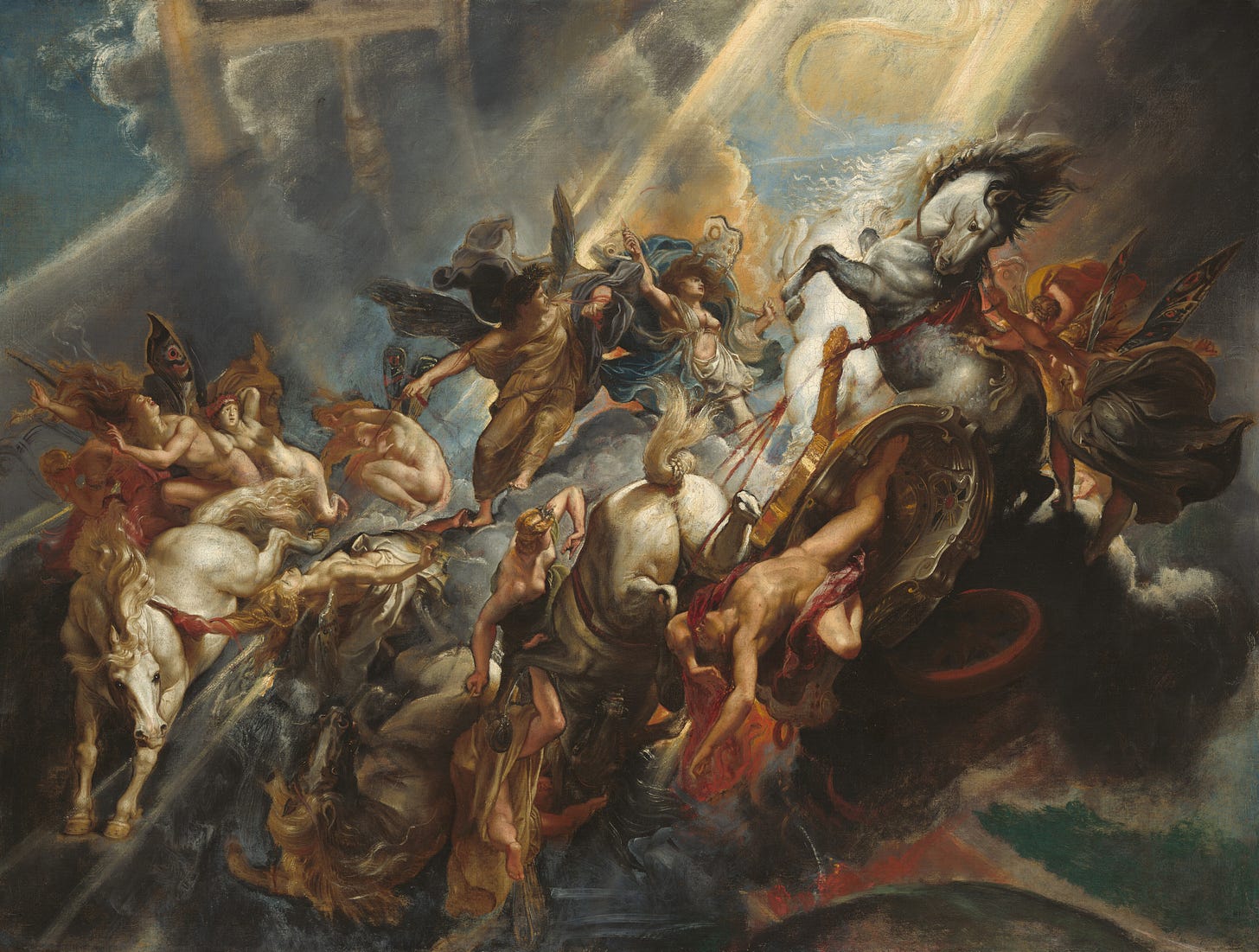The Fall of Phaeton
Listen to the podcast.
“Here Phaeton lies who in the sun god’s chariot fared. And though greatly he failed, more greatly he dared.” - Ovid, Metamorphosis
Few myths from the ancient world produce such a visceral appreciation for the importance of initiation as the Fall of Phaeton. The story is a simple one. Phaeton, the son of Clymene and Helios, the God of the Sun, makes the long journey to the blazing palace of Helios to prove his divine parentage. Helios swears by the River Styx and the Stygian Lake to grant him whatever wish he so chooses. With the bold impetuousness of youth, Phaeton requests to mount the chariot that draws the sun along its course every day. The chariot is pulled by two unruly flaming horses that breathe fire and burn so brightly that even Jupiter, the King of the Olympians, cannot master them.
This story is analogous to the crucial step that all children must take into adulthood. The step forward from the infantilism and irresponsibility of youth into the self-determination and autonomy that accompanies adulthood and maturity. This is natural in the archetypical cycle of life, but it is a step wrought with peril for those individuals that are unprepared for this initiation. The youth who are well-prepared and mentored for this initiation ritual evolve into responsible contributors to the social good in whatever domain they choose. On the other hand, the ill-prepared youth will devolve into a sort of psychological immaturity in perpetuity, at least until this initiation rite is completed satisfactorily. This is one of the most troubling challenges our current generation faces. We have eschewed time-honored rituals of initiation, which has postponed the maturity of an entire generation of men and women.
Despite his father's repeated warnings and lamentation for his son's unwise request, Phaeton does not relent. With tears in his eyes, Helios brings his son to his chariot, forged by Vulcan with a golden axel and silver spokes that burn with the light of the sun. Phaeton mounts the chariot with a smile and self-assuredness of his naïve youth, takes hold of the reins, and begins his fateful journey across the heavens. The horses, accustomed to Helios' strong and steady hands, grow unruly and begin to chomp and stamp. Phaeton soon loses control, and the sun chariot tears across the sky, setting the fabric of the heavens. The chariot darts high and low, to and fro, and soon Phaeton himself is screaming from fear and the chariot's terrible heat. The chariot swings low over Northern Africa and sets the Atlas Mountains ablaze. The sun's heat burns away all living things and creates the vast expanse of the Maghreb desert. The seas begin to boil as the chariot dips low into the Mediterranean. Phaeton is at risk of destroying the world. Helios, seeing this, understands he must seek Jupiter's intervention or risk the destruction of all. Already, the rest of the Gods of Olympus are entreating Jupiter to strike the wayward Phaeton with a lightning bolt. Hearing their pleas and the prayers of humankind below, Jupiter climbs to the highest column, takes aim, and smotes poor Phaeton with one of his dreadful bolts.
Phaeton falls to the earth, where his mother and sisters weep and lament the loss of such noble potential. In mourning for his son, Helios refuses to make his customary course across the heavens. The world falls into darkness. Finally, with the pleading of the Gods and the prayers of men, Helios relents and takes up his great chariot's reins once again and begins his now solemn and dutiful journey across the heavens.
Rituals are important. Whether this proves to be in a practical or purely psychological sense, ritual provides us a framework for understanding and contending with our world—these rites, or rituals, of initiation arm the coming generations for the great contest of life. To quote Marcus Aurelius, this transition allows them to be upright rather than be kept upright. These rituals can take many forms. These rites can be found in the military, public service, humanitarian work abroad, climbing a mountain, a long hunting trip, or they can be provided by any combination of these things. However, it is necessary that some event establishes a solid philosophical foundation and provides tangible evidence of their maturity, individuation, and competence. The myth of Phaeton should serve as a potent warning about the dangers of leaving the coming generations bereft of the rites and rituals that made our generation and preceding generations what they are today.


